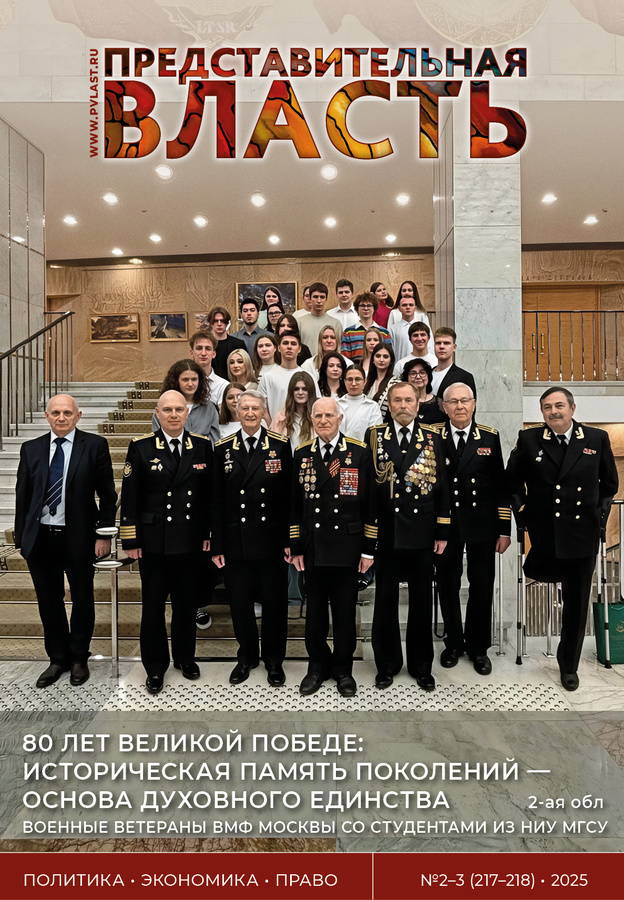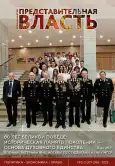ФОЛЬКЛОРНЫЕ ПРОЕКТЫ КАК СРЕДСТВО СОХРАНЕНИЯ КУЛЬТУРНОЙ ИДЕНТИЧНОСТИ В УСЛОВИЯХ ГЛОБАЛИЗАЦИИ
- Авторы: Рябов С.М.1
-
Учреждения:
- Московский государственный академический театр «Русская песня»
- Выпуск: № 2-3 (2025)
- Страницы: 53-57
- Раздел: Культурная политика
- URL: https://journal-vniispk.ru/2073-9532/article/view/301886
- DOI: https://doi.org/10.54449/20739532_2025_2-3_53
- ID: 301886
Цитировать
Аннотация
Статья посвящена исследованию значимости русского народного фольклора и его роли в формировании культурной идентичности. Исследование проводится социологическими методами анализа объектов социальногуманитарных наук, проявляющих свои свойства в продуктах духовной деятельности человека. В рамках данного исследования осуществляется комплексный анализ русского народного фольклора с целью выявления его актуальности для молодёжи и разработки эффективных стратегий его популяризации. В статье приводятся данные проведенного эмпирического исследования по определению уровня знаний о русском народном фольклоре среди различных возрастных групп населения города Москвы, а также разрабатываются инновационные методы вовлечения молодёжи в изучение и сохранение фольклорных традиций. В статье представлены рекомендации для образовательных учреждений и культурных организаций, направленные на активизацию интереса молодёжи к фольклору.
Актуальность исследования определяется ускорившимся процессом размывания культурных границ в условиях глобализации, при этом традиционные формы народного творчества подвергаются значительным трансформациям. Это приводит к ослаблению связи молодого поколения с культурными корнями, что, в свою очередь, ставит под угрозу сохранение уникального культурного наследия. Научная новизна исследования заключается в его междисциплинарном характере, сочетании теоретического анализа и практических рекомендаций, а также в акценте на необходимости адаптации фольклорных традиций к современным условиям, что является важным шагом на пути их сохранения и популяризации. Результаты работы подчеркивают важность фольклора как элемента культурного наследия, способствующего формированию идентичности и преемственности поколений в современном обществе. В статье сделан акцент на анализе уровня знания русского народного фольклора среди молодёжи и старших поколений, а также на выявлении причин непопулярности фольклора у молодежи. В работе рассматриваются как исторические, так и политические аспекты, связанные с фольклором и его ролью в современном обществе. Это исследование подчеркивает необходимость активного внедрения фольклорных проектов в социальную практику для сохранения культурной идентичности.
Об авторах
Сергей Михайлович Рябов
Московский государственный академический театр «Русская песня»
Автор, ответственный за переписку.
Email: ryabovsm@folkteatr.ru
директор Всероссийского фестиваля — марафона «Песни России», заместитель директора, заслуженный работник культуры Республики Крым
Россия, МоскваСписок литературы
- Бахтин М.М. Эстетика словесного творчества. М.: Искусство, 1986. С. 342.
- Бенедиктов А.В. Русский фольклор: традиции и современность. М.: РГГУ, 2010. С. 81.
- Bennett T. Culture, Identity, and the Representation of the Past. London: Routledge, 2005.
- Захарова Е.В. Фольклор в цифровую эпоху: новые форматы и подходы // Фольклор и современность. 2017. № 5(1). С. 12–20.
- Костина О.В. Популяризация фольклора через новые медиа // Научные записки. 2019. № 4(1). С. 67–75.
- Кузнецова Т.И. Фольклор и молодежь: вызовы современности // Молодежные исследования. 2021. № 3(2). С. 15–22.
- Маслова И.В. Культурное наследие и его роль в формировании идентичности молодёжи // Культурология и образование. 2020. № 2(1). С. 5–12.
- Рябова Е.А. Фольклорные традиции в образовательных программах // Вопросы образования. 2016. № 1(4). С. 30–35.
- Тихомиров В.П. Современные подходы к изучению фольклора // Фольклор и этнография. 2013. № 1(1). С. 44–50.
- Федорова Н.П. Цифровизация и фольклор: новые горизонты // Вестник цифровых технологий. 2022. № 8(2). С. 21–29.
- Wallace E. Cultural Identity and the Politics of Difference. New York: Routledge, 2003.
- Hayes S. The Role of Folklore in Cultural Identity // Journal of Folklore Research. 2019. № 56(2). С. 123–145.
Дополнительные файлы










